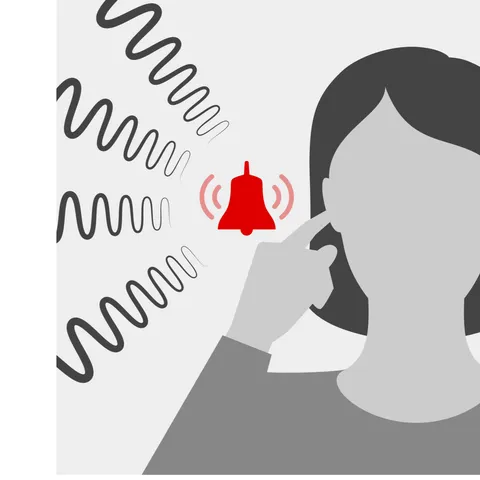Tinnitus (Ringing in Ears) - Causes, Symptoms and Treatment

Quick Summary
- Tinnitus is a condition where you hear ringing in one or both ears
- It is not a disease, but it can be extremely annoying and, in severe cases, may interfere with your daily life
- There are many different causes of tinnitus, including hearing loss, ear infections, and head injuries
- There is no cure for tinnitus, but there are treatments that can help to relieve the symptoms
Are you hearing sounds that no one else can listen to? This may be due to ringing in one or both ears, commonly known as tinnitus. Although you hear these ringing sound in ears, there is no external source for them.
Ringing in ears is not a disease, but the condition can be extremely annoying and, in severe cases, may interfere with your daily life. Now, you may want to know what is tinnitus. Read the blog to find out Tinnitus meaning, tinnitus causes, tinnitus symptoms and treatment.
What is Tinnitus?
Tinnitus is a medical term characterised by ringing, buzzing, chirping, hissing, whistling, and other sounds in the ear. The patient hears sounds that are not caused by external sources.
It is a common problem affecting almost 15% to 20% of people. Tinnitus is primarily a neurological phenomenon linked to the sense of hearing. An underlying condition, such as age-related hearing loss, an ear injury or a problem with the circulatory system, usually causes tinnitus. When the underlying cause of tinnitus is treated, tinnitus often gets better for many people.


Tinnitus Types
The sound in ear that people with tinnitus hear can be anything from a soft background sound to loud clear external noise. Usually, tinnitus sound can be categorised into 2 types:
- Subjective tinnitus: It is the most common type where only the affected person can hear the noises in their ear. It usually results from exposure to excessive noise and temporarily lasts up to 3-12 months at a time. However, in severe cases, it may be permanent.
- Objective tinnitus: It is a rare type caused by vascular deformities or involuntary muscle contraction, affecting mechanical structures near the ear.
Tinnitus Causes
Almost 75% of all health conditions can affect your ears and cause tinnitus. The major tinnitus causes are:
- Earwax: The beep sound in ear could be due to anything as simple as an accumulation of earwax in your outer ear.
- Head trauma: That ringing in ears you hear could be a sign of a jaw, neck, or head biomechanical issue if you've recently been in a car accident or hit your head.
- Diseases: Sometimes, ringing in ears is a sign of a medical condition like Meniere's disease. It happens when an abnormal buildup of fluid pressure in your inner ear. Additionally, diabetes and hypertension can lead to tinnitus.
- Medications: Some drugs may impact your hearing. High dosages of aspirin, some antibiotics, antidepressants, and chemotherapy medicines may cause you to hear a tinnitus sound.
- Dental problems: A non-auditory issue with your jaw or teeth might occasionally be related to ringing in the ears. The Temporomandibular Joint Disorder (TMD) issue might make the jaw joint pop or click noises, which can result in tinnitus sound.
Tinnitus Symptoms
Tinnitus is a ringing in ears when no external sound is present. However, tinnitus can also produce other imaginary noises in your ears. The tinnitus symptoms include noises like:
- Buzzing
- Hissing
- Humming
- Clicking
- Roaring
Tinnitus Diagnosis
The doctor diagnoses ringing in ears by examining the symptoms. However, the doctor will perform some diagnostic tests to identify the cause and treat those symptoms related to the imaginary sound in ear. These tests include:
- Blood tests : The doctor may take blood samples to check for conditions such as thyroid, heart disease, anaemia, or vitamin deficiencies.
- Hearing exam (Audiometry) : In this procedure, the doctor will have you seated in a soundproof room with earphones transmitting sound in one ear at a time. You will be asked to inform your provider when you hear a sound, and the results will be compared with normal hearing for your age.
- Movement : You will be asked to move your eyes, arms, neck and legs and clench your jaw. The changes in ringing can help determine the underlying disorder.
- Tympanometry : The doctor will use a handheld device called Tympanometer to check your eardrum.
- Imaging tests : Depending on the cause of tinnitus, the doctor may perform imaging tests such as MRI and CT scan. An MRI scan can help discover a tumour near your ear. Imaging tests can also help reveal changes in the blood vessels near the ear to determine if an underlying medical condition is causing ringing in your ears.
Tinnitus Treatment
There are various options for treating ringing in ears based on the cause and symptoms of tinnitus. These treatment options include:
- Medications
Medications cannot treat tinnitus. However, they can reduce the severity of its symptoms. The doctor may prescribe medications to treat the underlying causes, such as anti-anxiety drugs or anti-depressive drugs.
- Behavioural Therapies
Counselling and therapy help you live with tinnitus symptoms by changing your feelings about the symptoms. These treatment options include:- Cognitive Behavioural Therapy (CBT): It is a form of counselling in which a psychologist or mental health professional helps you modify your reaction to the ringing in your ear. Counselling also helps with other tinnitus-related problems, like anxiety and depression.
- Tinnitus Retraining Therapy (TRT): TRT is a treatment option for moderate to severe tinnitus involving a combination of sound therapy and counselling. The counselling session aims to change how you perceive the ringing. Sound therapy helps you habituate to the sound of tinnitus. For this therapy, you wear a device in the ear that plays a white noise covering up the ringing. You frequently habituate several auditory signals in the environment, such as refrigerators, air conditioners, etc.
- Relaxation techniques: Relaxation techniques such as exercises, deep breathing, and biofeedback can help manage stress and anxiety, reducing tinnitus symptoms.
- Sound-based Therapies
Some sound-based therapies can suppress the symptoms of tinnitus. A few therapies are:- Masking device: Resembling hearing aids, these devices produce a continuous white sound noise that is more pleasant than the ringing produced by tinnitus. It helps suppress the symptoms of tinnitus.
- Hearing aids: If the ringing in your ear is accompanied by hearing loss due to noise or age, using hearing aids can improve the symptoms.
- White noise machines: These devices produce environmental sounds like ocean waves as an effective treatment for ringing in the ear. Air conditioners and fans in the room also produce white noise, making the symptoms of tinnitus less noticeable at night.
- Lifestyle Changes
Lifestyle choices can help reduce your tinnitus symptoms. It can include:- Earwax removal: Clearing blockage from the ear by removing wax can help relieve tinnitus symptoms.
- Exercise: Regular exercise could be beneficial for overall health and well-being. Yoga has been shown to lessen stress and the symptoms of persistent tinnitus in those who practise it.
Takeaway
Tinnitus (ringing in ears) is a problem that could be due to any underlying health condition, such as thyroid, anaemia, and migraine. Tinnitus can disrupt your everyday life and make it difficult to sleep and concentrate. As a result, you may feel depressed, angry, or frustrated.
If you experience ringing in ears, consult a healthcare professional at HexaHealth TODAY! Our team of 1500+ expert doctors can help you manage tinnitus symptoms.
Frequently Asked Questions
What is tinnitus meaning?
What are tinnitus causes?
Underlying medical conditions can cause tinnitus or ringing in ear. A few tinnitus causes are:
- Earwax buildup
- Head trauma
- Medications
- Dental problems
What are tinnitus symptoms?
Tinnitus can produce imaginary noises in the ears. Here, the left ear ringing meaning and the right ear ringing meaning are both symptoms of tinnitus. The tinnitus symptoms include noises like:
- Roaring
- Buzzing
- Clicking
- Humming
- Hissing
What are the risk factors for tinnitus?
Certain factors can increase your risk of tinnitus. These factors include:
- Age: The number of functioning nerve fibres decreases as you age, causing hearing problems related to tinnitus.
- Sex: Men are more likely to experience ringing in the ear than women.
- Loud Noise Exposure: Being exposed to loud noises or people who work in noisy environments are more prone to developing tinnitus.
- Health conditions: Certain conditions, like high blood pressure, obesity, or cardiovascular problems, can increase your risk of tinnitus.
Can tinnitus sound be prevented?
Yes, certain kinds of tinnitus can be prevented. The preventive measures include:
- Turn down the volume of music or sound: Exposure to high-volume music without ear protection can lead to hearing loss and tinnitus.
- Use ear protection: If you cannot avoid loud volume noises, you should use ear protection to protect your hearing. Moreover, if you work in an environment with loud noises, you must always wear over-the-ear hearing protection.
- Reduce alcohol, caffeine, and nicotine intake: Intake of these substances can affect blood flow and lead to tinnitus.
- Maintain good cardiovascular health: Regular exercise and the right diet are important for healthy blood vessels. This can reduce the occurrence of tinnitus linked to blood vessel disorders or obesity.
What are the complications of tinnitus sound?
If you have ringing in ears, you may also experience other complications, such as:
- Headaches
- Stress and anxiety
- Depression
- Fatigue
- Problems with memory
- Trouble concentrating
- Problems with sleep
- Irritability
- Work and family life problems
When should you seek help for hearing tinnitus sound?
Tinnitus sound may not be a bothering condition for some people. However, for others, it may disrupt their normal lives when hearing imaginary sound in ear. You should consult your healthcare professional when you experience ringing in ear or beep sound in ear for at least a week. Seek medical care immediately if you experience:
- Tinnitus after an upper respiratory infection that does not get better within a week
- Hearing loss
- Dizziness
- Anxiety or depression
Is tinnitus a serious condition?
Can someone with tinnitus lead a regular life?
What causes my tinnitus to become louder?
With less sleep or if you have chronic sleep problems, the stress levels increase. Due to this, the sound in ear may feel louder.
How long does tinnitus typically last?
Last Updated on: 14 December 2022
Reviewer

Dr. Aman Priya Khanna
MBBS, DNB General Surgery, Fellowship in Minimal Access Surgery, FIAGES
12 Years Experience
Dr Aman Priya Khanna is a well-known General Surgeon, Proctologist and Bariatric Surgeon currently associated with HealthFort Clinic, Health First Multispecialty Clinic in Delhi. He has 12 years of experience in General Surgery and worke...View More
Author

An enthusiastic writer with an eye for details and medical correctness. An avid reviewer and publisher. She emphasises authentic information and creates value for the readers. Earlier, she was involved in making ...View More



 Open In App
Open In App